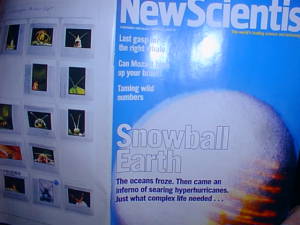Thursday 18 November 1999

|
Pic of the day: Picture of "New Scientist" (UK science magazine) with the fitting title "Snowball Earth". Just in time for the season. And it has this fascinating cover story about Earth being completely frozen over repeatedly in the past. *** I did not see any meteors last night. I did see white fluff falling down from the sky. The first snow of the season. Cold light in a dark season. There should be some prize to the one who came up with the idea of making the snow white. Imagine how nerve wracking it would have been if it had been, say, red or violet or yellow. Eww! Now instead the light of all the white makes the days last longer and even the moon can light up a white winter night. Of course, there is always a tradeoff. In the case of snow and ice, they reflect a lot of sunshine back into space, and so it becomes even colder. If this effect runs out of control, there could suddenly be another ice age. It has been believed that the reflective ice cover was one reason why the ice ages could last so long. We've had several such ice ages, and they last more than 100 000 years each, while the interglacial bouts of warmth only lasted about a tenth as long. In fact, the normal condition for the land where I live is to be covered by a glacier. We live through an exception. And a very welcome one, too. It is perhaps fitting, then, that the true "hell" of the Norse mythology was Niflheim, a land of numbing frost; not Muspellheim, the land of fire, as one would expect from religions born further south. Incidentally, the name "hell" comes from the Norse death goddess Hel (or some say "Hela"), but the home of Hel was not a place of punishment. It was a grey, dreary place of fading away. Feminist mythologists have hinted that the land of Hel may have once been a comforting concept. That Hel was the Great Earth Mother, kind of like Gaia in Greek mythology. A protector who embraced the dead into her safe bosom. The perennial enemies of the Norse pantheon were the Giants, not least the Frost Giants. In geological context this is most fitting, for our lands have been literally weighed down by frost giants - glaciers - until around 10 000 years ago. To this day, parts of Scandinavia are still slowly rising, after being pressured down for 100 000 years. The glaciers were however not vanquished by young powerful gods, but by safeguards built into our blue planet from its creation. The atmosphere contains small amounts of CO2, carbon dioxide, which keeps the heat in ("greenhouse effect"). Rain washes CO2 out of the atmosphere, it reacts with calcium and is felled out on the sea floor. Then plate tectonics ploughs it down under the continents. Eventually CO2 is released again from volcanoes and comes back in the atmosphere. Ice ages create a much drier climate. If no other processes stop the freezing, then the slow build up of carbon dioxide will do so. This seems to have happened repeatedly in the past, when life was young. The recent ice ages, however, seem to have been ended by sea currents. And just in case everything else should fail, the sun is slowly gaining in intensity. Not enough to be noticed during a lifetime or the time of human civilization, for sure. But over a span of hundreds of millions of years, the heat will be enough to thaw up any ice age. In fact, sooner or later Mars should thaw up too. There is probably still some water under the old seas and in the polar caps. But it won't happen in my time, I'm afraid. What could have happened in my lifetime was the onset of another ice age. While these cannot last indefinitely, they can last a hundred thousand years, which is more than enough to render to dust all hints that humans once walked these hills and valleys. And judging from the other interglacials, the time is right for another one. Temperature has been slowly dropping - in fits and starts, but over the millenia the trend is quite stable. Since shortly before the onset of the bronze age, it has grown steadily colder. At the time human civilization was born, hippos bathed in the Seine where Paris is today, and wild boars roamed the leafy forests covering Scandinavia. Monkeys chattered in Spain, and Sahara was a green sea of grass. It is quite possible that if not for the industrial revolution, the Ice Age would have returned to my lands by now. Until then, the trend was gradually cooling. But from early last century, things have been looking up, and the heat is still on. If this is the greenhouse effect, keep your engines spinning. I can live with a green Christmas if that means we can continue to live up here. Though the snow has not entirely forgotten its ancient realms, it seems... *** In extremely local news, I went to the dentist today again. This time he actually tried to fix the tooth where a part had fallen off so it cut my tongue. Sadly, it bled too much so he could not finish it. Now I have a weak temporary filling; he told me not to chew too much on that side. While he is in London. Two weeks. *** There was no new Nova Notes today. Something terrible must have happened. Al would not have skipped an entry for some slight setback, like the house burning down or some such. I'm not drawing any further conclusions until I hear rumors. |
Yesterday <-- This month --> Tomorrow?
One year ago